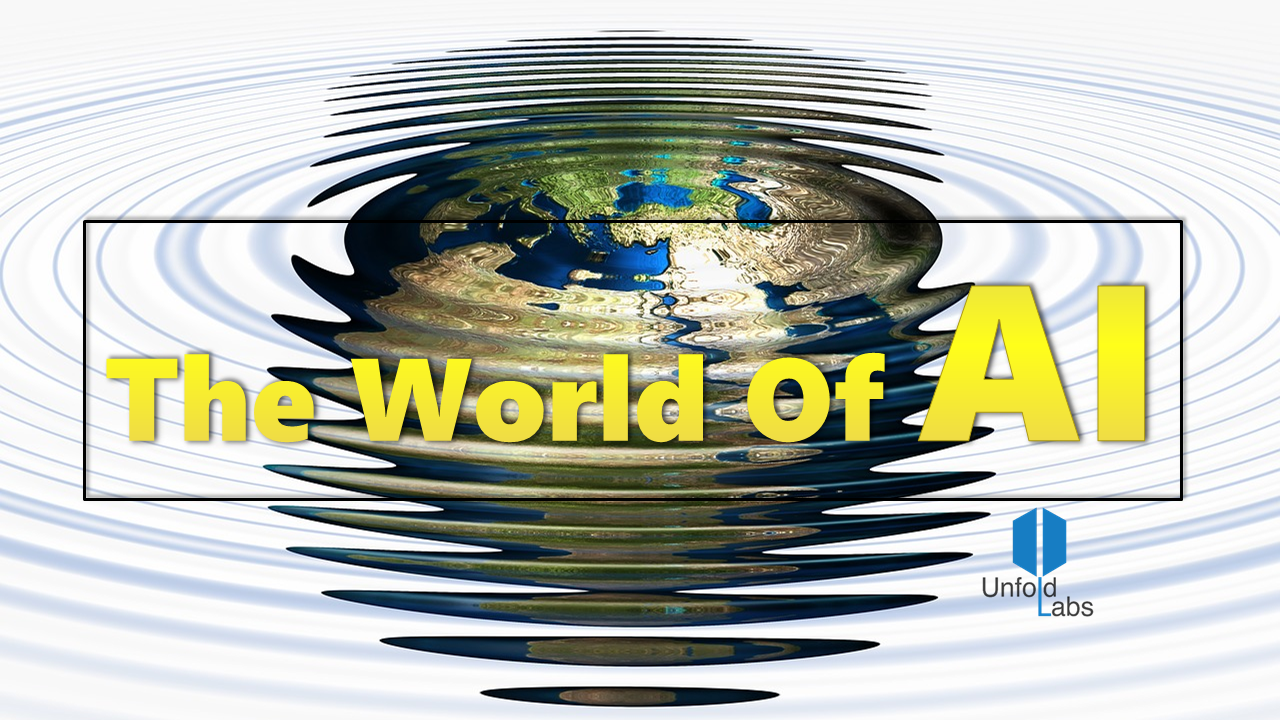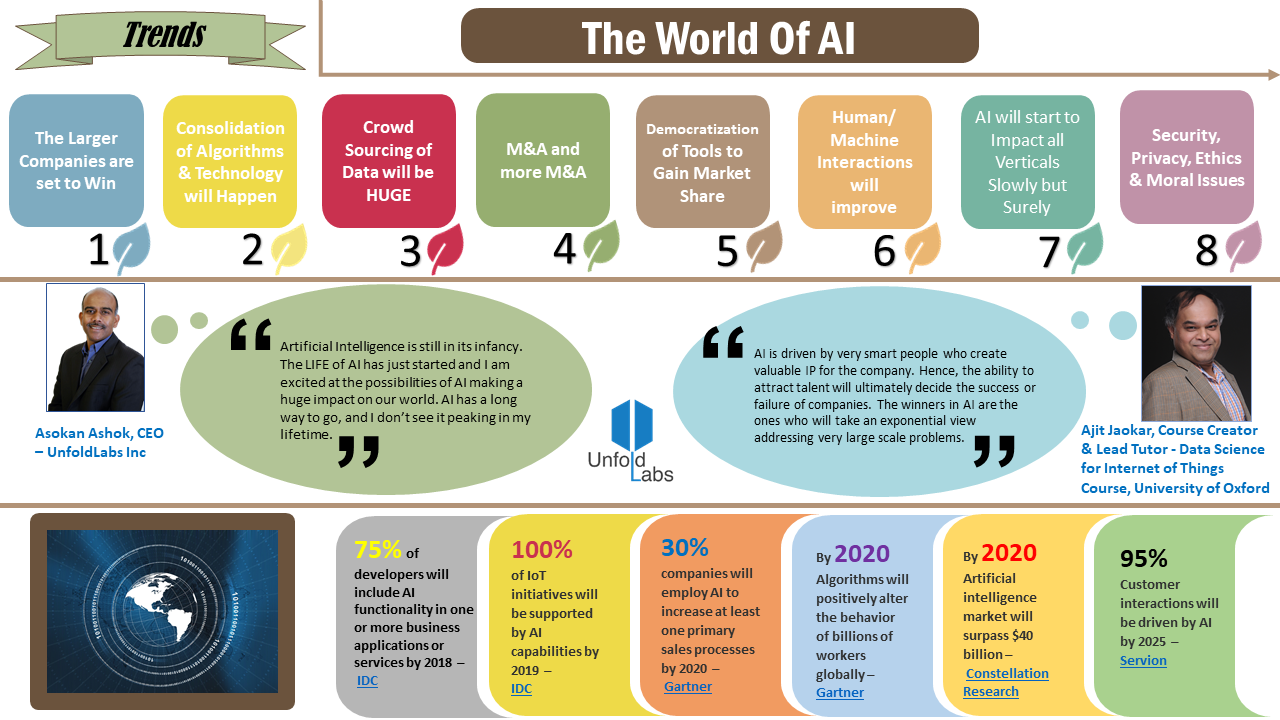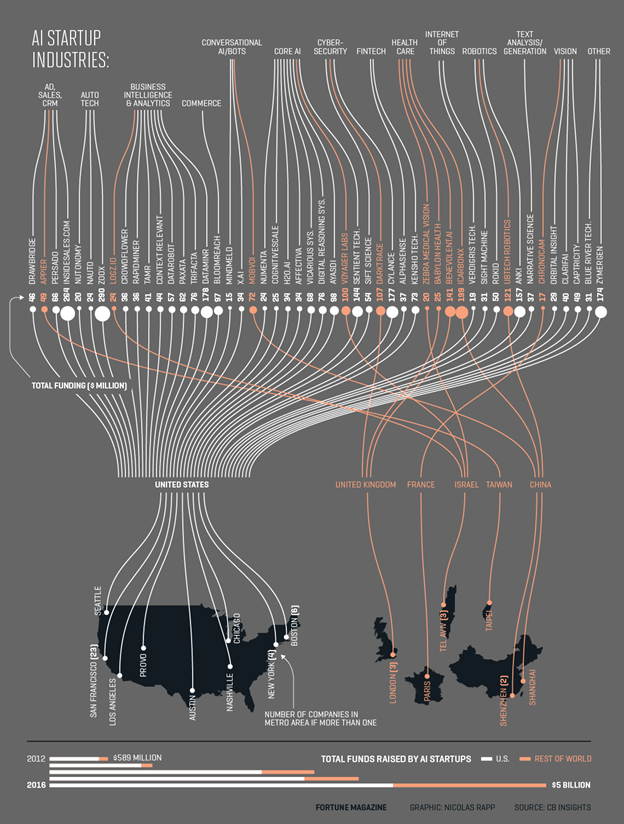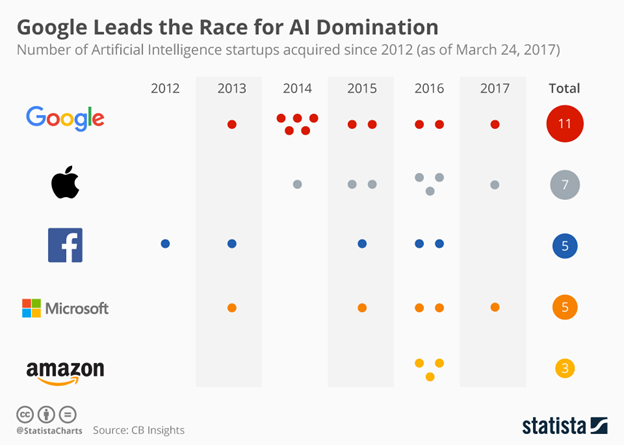The World of Artificial Intelligence
8 Trends to Watch in 2018

Computationally analyzing Big Data is not a passing trend. As volumes of data continue to grow, so will the improvements in analyzing big data. When it comes to applications of Predictive Analytics, we have only seen the tip of the iceberg. It has already helped organizations (i.e. forecasting sales, optimizing marketing campaigns) by using data mining, machine learning and AI techniques to analyze current data. All of these different types of Artificial Intelligence are tied together in a way that has profoundly changed the way we perform everyday tasks, and more is yet to come.
Here are some key statistics from the world of AI, Big Data, Predictive Analytics and Machine Learning:
- 75% of developers will include AI functionality in one or more business applications or services by 2018 — IDC
- 100% of IoT initiatives will be supported by AI capabilities by 2019 — IDC
- 30% of companies will employ AI to increase at least one primary sales processes by 2020 — Gartner
- Algorithms will positively alter the behavior of billions of workers globally by 2020 — Gartner
- The artificial intelligence market will surpass $40 billion by 2020. — Constellation Research
- AI will drive 95% of customer interactions by 2025 — Servion
Here are our 8 AI Trends to Watch in 2018

Trend 1 — The Larger Companies are set to Win
Amazon, Google, Facebook, and IBM are set to lead the way in Artificial Intelligence. As larger companies, they have the right resources to collect data, and therefore, have more data to work with.
Here is what the top players in the industry are doing with respect to AI:
Amazon:
- Investing in AI for over 20 years.
- Web crawl data from over 5B web pages
- Over 500,000 JPEG images and corresponding JSON metadata files describing products in an operating Amazon Fulfillment Center
- AOver a quarter-billion records updated daily monitoring the world's broadcast, print, and web news
- Nearly 100M images and videos with audio and visual features and annotations
- Amazon's Echo leads the voice-activated assistant market by a margin of over 70%
Google:
- One of the largest repositories of datasets, with 10–15 Exabyte of data — Cirrus Insight
- Focuses on applications and product development rather than long-term AI research
- A team of over 1,300 researchers — Google Brain
- 23.8% user share of the voice-activated assistant market — Voicebot
- Using the open source platform for machine learning, TensorFlow, to give anyone access to machine learning platforms
- Size of Google Earth database is estimated as 3,017 TB or approximately 3 Petabytes — Google Earth Blog
- Google Street View has about 20 Petabytes of street photos — Peta Pixel
Facebook:
- Processes 2.5B pieces of content and 500+ terabytes of data daily — Tech Crunch
- Facebook Artificial Intelligence Researchers (FAIR) has about 80 researchers and engineers — FAIR
- Generates 2B "Likes" and 300M photos a day — Tech Crunch
- Scans about 105 terabytes of data every 30 minutes - Tech Crunch
- Built a 62,000 square foot data center that can house 500 racks that hold 1 Exabyte of cold storage
- Translates about 2B user posts daily in over 40 languages, and translations are seen by 800M users daily — Fortune
IBM:
- Plans to make a 10-year, $240M investment to create the MIT — IBM Watson AI Lab — IBM
- Has over 2000 employees worldwide, with over 600 in the NY headquarters — IBM
- Watson client engagements span six continents and over 25 countries — IBM
- IBM is investing $1B in the Watson Group, including $100M for venture investments to support IBM's start-ups and businesses building cognitive apps made with Watson — IBM
- Over 7,000 applications have been built through the Watson Ecosystem — Fortune
Google is most likely in the forefront in terms of deploying machine learning for applications and product development and services. Not only were they the first company to start AI research, but with over 70,000 employees, Google is quite a large company. Moreover, with Google Brain, a deep learning AI research project, Google has an entire team with its own research agenda covering areas that include machine learning, natural language understanding, machine learning algorithms and techniques, and robotics.
Global List of 100 Most Promising AI Companies

Trend 2 — Consolidation of Algorithms & Technology will Happen
All the Tier2 companies that have invested in AI, like Intel, Salesforce and Twitter, will follow the larger companies that have the data, and start to use their data algorithms and AI. Data trading will occur between the players in the industry and it is most likely that algorithms and technology will be consolidated. The trading of data as well as consolidation of algorithms and technology will make AI more effective.
With larger players like Google and Facebook acquiring smaller players, algorithms will be integrated into their core platforms/solutions. The London-based AI Company, DeepMind, which builds general-purpose learning algorithms, was acquired by Google to gain business advantages against other tech companies. Facebook, on the other hand, acquired Wit.ai to help with speech recognition and voice interfaces. It also acquired AI startup, Ozlo, to improve its M virtual assistant.
Trend 3 — Crowd Sourcing of Data will be HUGE
All AI companies will go after huge data sets to find ways and means to execute their ambition towards AI. These companies will start to crowdsource large volumes of data. Companies have found different ways to assess crowdsourced data for quality and authenticity, giving not only businesses the power to benefit from this data, but giving consumers a voice as well.
Joel Gurin, founder and editor of OpenDataNow.com, states that "We're living in a culture of crowdsourcing, where more and more people are willing and interested to share what they know through social media."
Joel Gurin, founder and editor of OpenDataNow.com, states that "We're living in a culture of crowdsourcing, where more and more people are willing and interested to share what they know through social media."
Google is getting a lot of images through crowdsourcing to build their imaging algorithms. It is also using crowdsourcing to aid in improving services like translation, transcription, handwriting recognition and maps through its Crowdsource app. Amazon is also using crowdsourcing artificial intelligence to improve Alexa's more than 15,000 current skills.
Trend 4 — M&A and more M&A
CBInsights has statistics that show the race to acquire AI companies has started/ 2018 will be the year when we will see more and more mergers and acquisitions as companies compete for intellectual capital and talent. All the smaller players in the Machine Learning/AI space will get acquired by large companies. There are two reasons for this:
- AI cannot work in isolation without data sets. Since the larger companies have enormous amounts of data sets, they will prove to be too competitive for the smaller players.
- Algorithms without data serves no purpose. Without algorithms, data is pretty much useless. Data is at the core of algorithms, and getting large amounts of data is of utmost importance.
As robotics engineer and director of Columbia University's Creative Machines Lab, Hod Lipson puts it, "Data is the fuel and the algorithm is the engine."

Trend 5 — Democratization of Tools to Gain Market Share
The larger companies will start to open source their algorithms & other tool sets to gain market share. Market-based access to data and algorithms entry barriers will decrease and new applications of AI will increase. Through democratization, smaller companies, which have limited or no access to AI tools, will have access to large amounts of data for training and launching sophisticated AI algorithms.
As Sundar Pichai, Google's CEO, said about democratizing artificial intelligence, "One of the most exciting things we all can do is demystify machine learning and AI. It's important for this to be accessible by all people."
Furthermore, frameworks, SDKs and APIs will become the norm for all the major players to open up consumer usage. SaaS & PaaS based models will be the business models that all these companies will go after.
Trend 6 — Human/Machine Interactions will Improve
Siri and Alexa are probably the two most popular Human-Machine interaction tools. More robot based solutions similar to these will be the first level of entry for AI companies. For example, though machines have been programmed for speech analytics and facial recognition, machines will be able to recognize your mood, known as emotional analytics, based on the tone of your voice.
Manufacturing automation and aspects around non-consumer focus solutions will be the first set of solutions/applications to improve. Manufacturing automation will improve mainly due to labor cost savings with the use of sophisticated technology that includes automation, robotics, and advanced manufacturing. An improvement in non-consumer solutions, such as human-machine interactions in performing tasks in the fields of agriculture and medicine, will also be prevalent in 2018.
Trend 7 — AI will start to impact all verticals slowly but surely
Manufacturing, customer service, finance, healthcare, and transportation have already been impacted by AI. Self-driving cars are already expected to hit the market by 2018. Next year, AI will affect even more verticals. Brief examples of industries and how AI will impact them include:
- Insurance — AI will improve the claims process through automation
- Legal — NLP can summarize thousands of pages of legal documents in minutes, thereby reducing time and improving efficiency
- PR & media — AI will help to rapidly process data
- Education — The development of virtual tutors; AI-assisted paper grading; adaptive learning programs, games, and software; and personalized education programs powered by AI will change the way students and teachers interact
- Health — Machine learning may be used to create more complex, accurate methods to predict diseases years before patients show symptoms
Just as the industrial revolution transformed almost everything 100 years ago, AI will transform the industry in the next few years.
Trend 8 — Security, Privacy, Ethics & Moral Issues
Everything under the umbrella of Artificial intelligence, such as machine learning and big data, are vulnerable to emerging security and privacy problems. Sometimes playing an important part is the critical Infrastructure. The need for security related to privacy issues, like keeping bank accounts and health information private, will create a greater need for security research. 2018 will be the year where concerns with security and privacy will certainly be addressed and possible new developments will be made.
Ethics of Artificial Intelligence will also be a major concern in 2018. Ethics and moral issues that need to be addressed include how AI can harm or benefit humans. There's also been concern about the possibility of robots replacing humans, especially if AI will be used in field wherein human empathy is important, such as nurses, therapists, or police officers. Another issue that will be dealt with is autonomous weapons. Given a level of autonomous functions, there will be a need for AI to override certain functions, unlike weapons controlled by humans.
Our Take
Although Artificial Intelligence has been around for many years, AI as we know it today is still in its infancy. There has been a ton of hype around AI and its various applications, from autonomous vehicles to virtual personal assistants and a myriad of other technologies that perform tasks that normally require human intelligence. Although there is a long list of AI use cases, most of which aim at improving specific processes, getting them successfully deployed will take time. Furthermore, there aren't many players in the AI industry so fragmentation will not be present, and unstructured data and algorithms to process them will become available. The LIFE of AI has just started…and it has a longer way to go.
. . .
This post was written by Asokan Ashok, the CEO of UnfoldLabs. Ashok is an expert in driving customer insights into thriving businesses and commercializing products for scale. As a leading strategist in the technology industry, he is great at recommending strategies to address technology & market trends. Highly analytical and an industry visionary, Ashok is a sought after global high-tech industry thought leader and trusted strategic advisor by companies.
. . .
Entrepreneur. Inventor. Product Ideation. Strategist. Visionary. Evangelist. Architect.

